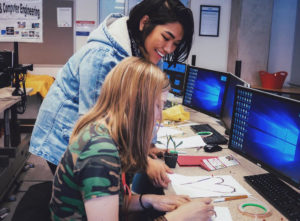 The National Academy of Engineering (NAE) has named Iowa State University a top institution for diversifying engineering education based on admissions policies, practices and processes.
The National Academy of Engineering (NAE) has named Iowa State University a top institution for diversifying engineering education based on admissions policies, practices and processes.
According to a press release from the organization, NAE received nominations from accredited four-year undergraduate schools with engineering or engineering technology programs. The submissions were reviewed by an NAE-appointed committee and judged based on improvements in enrollment diversity, creative and research-based features of the program and measures of success.
The Iowa State nomination was coordinated in part by Diane Rover, University Professor of Electrical and Computer Engineering. “We are taking a comprehensive approach using strategic partnerships across student and academic affairs, applying evidence-based practices, leveraging scholarship funds from the National Science Foundation and involving many stakeholders,” Rover said. “We are very excited about the progress we are making.”
The NAE says diversifying the U.S. engineering workforce requires action and interventions throughout the engineering education and workforce system, especially at important transition points such as university admissions.
The Iowa State NAE nomination was supported by several teams including: the ISU Department of Electrical and Computer Engineering (ECpE); ISU Program for Women in Science and Engineering (WiSE); and Electrical, Computer and Software Engineers as Leaders (ECSEL) – a multi-institutional collaborative effort among Iowa State University, Des Moines Area Community College and Kirkwood Community College providing scholarships for students majoring (or preparing to transfer) in electrical engineering, computer engineering, software engineering, and cybersecurity engineering.
As a follow-up to the recognitions, NAE will facilitate the sharing of information and expertise from the recognized institutions and promote collaboration to help attendees advance their efforts and develop effective plans for their own institutions. Ultimately, the project will improve the way engineering schools evaluate the potential success of and accept applicants from all backgrounds and will disseminate best practices to support institutions as they diversify their engineering programs, which will benefit current and future engineers as well as the broader workforce.
These efforts complement the range of programs ISU’s College of Engineering provides to enhance diversity and inclusion, including the LEAD Program and Learning Community for multicultural and women students created to support their academic, professional and social success and retention; the Engineering International Student Network; the First Year Mentor Program for Ph.D. students of color; the ISU McNair Program, designed to increase the number of underrepresented, low-income and first-generation students obtaining a Ph.D.; the LSAMP IINSPIRE Program for underrepresented minority students in STEM in the Midwest; and the Carver Academy to promote continuous learning, achievement and integrity.
“These types of programs are critical to the success and retention of all of our students in the College of Engineering, especially our underrepresented populations. The presence of a diverse student body enables our future engineers to be exposed to a wide array of perspectives and ways of knowing and doing that will greatly assist in their cultural awareness and competency,” said LeQuetia Ancar, assistant director of engineering student services and director of multicultural student success. “With the ever changing demographics of the workforce, it is critical that we are preparing all of our students to be successful, and these types of programs are just one way of doing this. Lastly, and most importantly, these programs create a greater sense of connection and belonging while supporting students on their academic journey. When students feel like they are an important part of our community, they are more likely to persist to graduation.”